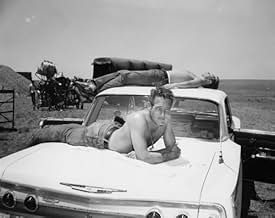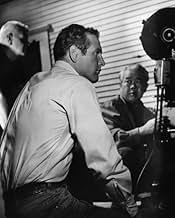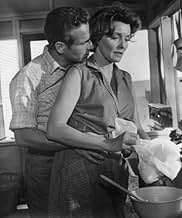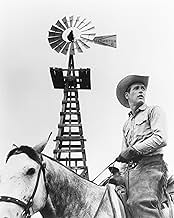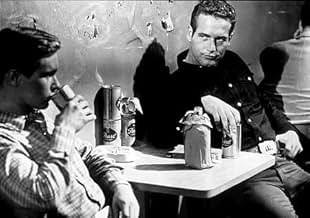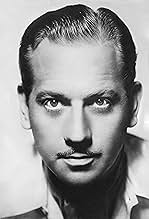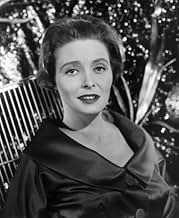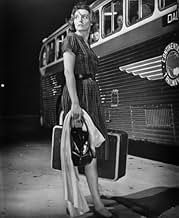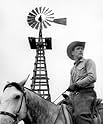VALUTAZIONE IMDb
7,8/10
25.217
LA TUA VALUTAZIONE
Paul Newman interpreta Hud Bannon, il figlio ribelle del rispettabile proprietario di un ranch, in continuo conflitto con l'anziano padre.Paul Newman interpreta Hud Bannon, il figlio ribelle del rispettabile proprietario di un ranch, in continuo conflitto con l'anziano padre.Paul Newman interpreta Hud Bannon, il figlio ribelle del rispettabile proprietario di un ranch, in continuo conflitto con l'anziano padre.
- Regia
- Sceneggiatura
- Star
- Vincitore di 3 Oscar
- 17 vittorie e 17 candidature totali
Brandon De Wilde
- Lonnie Bannon
- (as Brandon de Wilde)
Sharyn Hillyer
- Myra
- (as Sharon Hillyer)
Warren Anderson
- Proprietor Sweeping Glass
- (non citato nei titoli originali)
Recensioni in evidenza
I knew I had seen it, I had a black and white James Wong Howe Cinemascope memory and Paul Newman's body language. How he walks, how he stands. I remember thinking that Jake Gyllenhaal had borrowed that physicality for his character in "Brokeback Mountain" and I just realized that Larry McMurtry is the author of both "Brokeback Mountain" and "Hud". He provides us with a look into the modern cowboy that is not only unique but mesmerizing. Paul Newman's Hud is a cad and yet you feel we sense that behind the bravado hides a desperate man looking for something. Something personal and unspoken. Hud is one of my favorite Newman performances. Soulless and yet needy. Is it a coincidence that the only woman that"got away" from Hud is named Alma? - Alma in Spanish means soul - Alma is played by Patricia Neal with power and humanity and she won the Oscar for it. Melvyn Douglas also won the Oscar for his superb performance and Brandon de Wilde deserved one of his own. He is extraordinary. Hud has become an important film in my life and in future viewings in years to come I may discover why.
10krdement
As a native of West Texas, I think this film is one of the finest in American cinema. You don't watch a movie - you experience a real time and place. I happen to love a bunch of Paul Newman's films (The 3 H's - Hud, Hombre and Harper; Cool Hand Luke; The Sting; The Hustler; The Color of Money...), but I'm not what you'd call a rabid fan. I think he is compelling, but has a fairly limited range. He is perfect in this role, but it isn't much different from The Hustler or Cool Hand Luke. However, watching Melvyn Douglas is like watching somebody that Marty Ritt pulled off of some ranch and filmed in his daily life. His performance is absolutely dead- on. The gravelly drawl, the old boy shuffle, his expression - the way his eyes take in the landscape or gaze intently into a bowl of ice cream while Hud talks - all incredibly REAL! I KNOW those old guys!
Melvyn Douglas is a truly under-appreciated American acting genius whose career spanned over 5 decades. His range is tremendous. This is the same honey-tongued actor who is the perfect comic foil to Garbo's Ninotchka in the '30's (In fact, he is one of her only REPEAT leading men!) And his bluster-filled performance in I Never Sang for My Father (with another modern great, Gene Hackman) is also out of this world! Other commentators have addressed Hud's multi-faceted story and the incredible B&W cinematography. All wonderful - but the next time you watch this true American classic, focus on Douglas' Oscar-winning performance. You will be amazed! (And remind yourself of some of the early roles in romantic comedies - Ninotchka, That Uncertain Feeling, This Thing Called Love or Mr. Blandings Builds His Dream House - this same actor performed so well.)
Melvyn Douglas is a truly under-appreciated American acting genius whose career spanned over 5 decades. His range is tremendous. This is the same honey-tongued actor who is the perfect comic foil to Garbo's Ninotchka in the '30's (In fact, he is one of her only REPEAT leading men!) And his bluster-filled performance in I Never Sang for My Father (with another modern great, Gene Hackman) is also out of this world! Other commentators have addressed Hud's multi-faceted story and the incredible B&W cinematography. All wonderful - but the next time you watch this true American classic, focus on Douglas' Oscar-winning performance. You will be amazed! (And remind yourself of some of the early roles in romantic comedies - Ninotchka, That Uncertain Feeling, This Thing Called Love or Mr. Blandings Builds His Dream House - this same actor performed so well.)
Those are the nihilistic words of Hud Bannon, the swaggering antihero in the Martin Ritt directed film "Hud", set amid the vast, expansive high plains of West Texas. It's a somber affair.
Hud lives with his elderly father Homer (a wonderfully understated performance by Melvyn Douglas) and nephew Lonnie. Their small, struggling ranch serves not only as a livelihood, but also the source of Homer's ethical values. Another main character is Alma, the attractive housekeeper and cook. For all four of them it's a hard life, but a worthwhile life, at least as Homer sees it. Hud sees it differently. But then Hud is a product of modern times, with differing values from those of Homer and his generation. When a crisis occurs that puts their ranch in jeopardy, these differing values clash, resulting in tension between Hud and his father.
Hud's ongoing rebellion, rooted in heredity and environment, takes the form of booze, brawls, women, and anger. Hud is a heel, but a sympathetic heel. We understand his frustrations. Larry McMurtry's story presents a naturalistic interpretation of human character. Hud is constrained by forces over which he has no control. For him, like for many of us, freedom of choice is mostly an illusion. The morality of absolutes, as expressed by his father, does not work in Hud's favor.
But there's a fifth character in this morality tale ... the land. The bleak, desolate plains with its buzzards, ubiquitous dust, and lonesome vistas can depress the most optimistic spirit. In this film, the monochrome canvas accentuated by James Wong Howe's use of single source lighting makes the natural environment seem appropriately oppressive. And the film's sounds amplify the gritty realism of this unforgiving land.
I have a couple of minor criticisms. The screenplay puts too much emphasis on Alma, given that she is the housekeeper. Second, there's not enough music or humor. Others will disagree, but I would have preferred a more prominent role for the mournful sounds of Hank Williams type music, a la "The Last Picture Show".
Interestingly, Hud's comment on life is the same in meaning as the words spoken years later by a real-life nihilistic antihero, who said: "No one here gets out alive". While we think we know what happened to the real-life antihero, we don't know what became of Hud. Perhaps someday someone will make a credible sequel. Then they can add more music. Imagine the mood evoked by the sight of Hud riding off into the Texas sunset, to the sounds of "Riders On The Storm".
Hud lives with his elderly father Homer (a wonderfully understated performance by Melvyn Douglas) and nephew Lonnie. Their small, struggling ranch serves not only as a livelihood, but also the source of Homer's ethical values. Another main character is Alma, the attractive housekeeper and cook. For all four of them it's a hard life, but a worthwhile life, at least as Homer sees it. Hud sees it differently. But then Hud is a product of modern times, with differing values from those of Homer and his generation. When a crisis occurs that puts their ranch in jeopardy, these differing values clash, resulting in tension between Hud and his father.
Hud's ongoing rebellion, rooted in heredity and environment, takes the form of booze, brawls, women, and anger. Hud is a heel, but a sympathetic heel. We understand his frustrations. Larry McMurtry's story presents a naturalistic interpretation of human character. Hud is constrained by forces over which he has no control. For him, like for many of us, freedom of choice is mostly an illusion. The morality of absolutes, as expressed by his father, does not work in Hud's favor.
But there's a fifth character in this morality tale ... the land. The bleak, desolate plains with its buzzards, ubiquitous dust, and lonesome vistas can depress the most optimistic spirit. In this film, the monochrome canvas accentuated by James Wong Howe's use of single source lighting makes the natural environment seem appropriately oppressive. And the film's sounds amplify the gritty realism of this unforgiving land.
I have a couple of minor criticisms. The screenplay puts too much emphasis on Alma, given that she is the housekeeper. Second, there's not enough music or humor. Others will disagree, but I would have preferred a more prominent role for the mournful sounds of Hank Williams type music, a la "The Last Picture Show".
Interestingly, Hud's comment on life is the same in meaning as the words spoken years later by a real-life nihilistic antihero, who said: "No one here gets out alive". While we think we know what happened to the real-life antihero, we don't know what became of Hud. Perhaps someday someone will make a credible sequel. Then they can add more music. Imagine the mood evoked by the sight of Hud riding off into the Texas sunset, to the sounds of "Riders On The Storm".
10T-Gore
Paul Newman gave easily his greatest performance as Hud Bannen, the hard-fighting, hard-drinking, womanising ne'er-do-well, who casts a malign shadow over the lives of his family and their housekeeper on a Texas ranch. It is a strong all-round cast however, and Melvyn Douglas and Patricia Neal both won Academy Awards for their performances. The sparse and grainy cinematography by James Wong Howe (another Oscar winner) brilliantly captures the harsh, arid Texas landscape. Adapted from Larry McMurtry's novel Horseman Pass By, this is one of the finest examples of American Cinema in the 1960's, not least in its depiction of father-son conflict, and the way one in which one man can profoundly influence, for the worse, the lives of those around him. Newman worked as a ranch-hand in Texas to prepare for the role, which helped him obtain his authentic Texan credentials, most notably his accent, and his cocky strut and manner. A timeless classic, which can be viewed again and again.
It's difficult to grasp that Melvyn Douglas spent most of his career sailing through light, romantic roles and emerged in old age as one of the greatest actors in cinema history. Knowing the talent he possessed, how did he keep from killing the heads of the studios? Paul Newman, Melvyn Douglas, Patricia Neal, and Brandon de Wilde star in "Hud," an unsparing 1963 morality story about a Texas rancher, Homer Bannon, his bastard son, Hud, his housekeeper, and his grandson. The bastard, of course, is Paul Newman, who doesn't have a decent bone in his body. People on this board have said it's his greatest performance. He's given so many great ones, it's hard to say for me. An astounding actor, and he gets a run for his money from Douglas, who plays the moral center of the story.
The two characters couldn't be more opposite, as one sees in their treatment of a potential run of hoof and mouth disease that could wipe out Homer's entire herd. Hud wants to ship the whole herd out and possibly infect other people's cattle - he couldn't care less. Homer won't hear of it.
If you love animals, this is a difficult film to watch, but it's worth it. Melvyn Douglas is absolutely gut-wrenching as Homer, a proud man who loves the land and his cattle and who has no use for his son, who smashed his car and killed Homer's other son. de Wilde is Hud's nephew who admires him and wants to emulate him but as time goes by, realizes that Hud is made of ice. de Wilde doesn't give an emotional performance - he's almost more of an observer. It works well here amidst the very contained Douglas and the free and easy Newman. You can see he's a good kid trying to grow up and decide what kind of man to be.
Patricia Neal is the housekeeper; she and Douglas both deservingly won Oscars. Her delivery is wry and knowing; she can't help being attracted to the virile Hud but she knows he's trouble and never gives in to her desires willingly.
As much as I love Newman and think he's one of the greatest actors ever to hit the movies, for me, Douglas' searing performance is the one that will stay with me. It's easy to see why in 1963 this was such a dramatic breakthrough for Newman, but 43 years and many roles later, we're more familiar with what he can do. We know he can play a cold bastard now. His greatest performances for me will always be those in the "The Verdict" and "The Hustler," both of which called for many more nuances of character. Hud represents '60s disillusionment - which as the decade went on was only going to get worse; this is one of the reasons it is an iconic role. For me, Newman had more surprises in store.
Brilliant performances, excellent direction, stark photography, Hud is a great American film, not easily forgotten once seen.
The two characters couldn't be more opposite, as one sees in their treatment of a potential run of hoof and mouth disease that could wipe out Homer's entire herd. Hud wants to ship the whole herd out and possibly infect other people's cattle - he couldn't care less. Homer won't hear of it.
If you love animals, this is a difficult film to watch, but it's worth it. Melvyn Douglas is absolutely gut-wrenching as Homer, a proud man who loves the land and his cattle and who has no use for his son, who smashed his car and killed Homer's other son. de Wilde is Hud's nephew who admires him and wants to emulate him but as time goes by, realizes that Hud is made of ice. de Wilde doesn't give an emotional performance - he's almost more of an observer. It works well here amidst the very contained Douglas and the free and easy Newman. You can see he's a good kid trying to grow up and decide what kind of man to be.
Patricia Neal is the housekeeper; she and Douglas both deservingly won Oscars. Her delivery is wry and knowing; she can't help being attracted to the virile Hud but she knows he's trouble and never gives in to her desires willingly.
As much as I love Newman and think he's one of the greatest actors ever to hit the movies, for me, Douglas' searing performance is the one that will stay with me. It's easy to see why in 1963 this was such a dramatic breakthrough for Newman, but 43 years and many roles later, we're more familiar with what he can do. We know he can play a cold bastard now. His greatest performances for me will always be those in the "The Verdict" and "The Hustler," both of which called for many more nuances of character. Hud represents '60s disillusionment - which as the decade went on was only going to get worse; this is one of the reasons it is an iconic role. For me, Newman had more surprises in store.
Brilliant performances, excellent direction, stark photography, Hud is a great American film, not easily forgotten once seen.
Lo sapevi?
- QuizPatricia Neal was particularly proud of one unscripted moment that made it into the film. While talking to Hud about her failed marriage, a huge horsefly flew onto the set. Just as she says she's "done with that cold-blooded bastard," she zaps the fly with a dish towel. Martin Ritt loved it and printed the take.
- BlooperIn the first scene, you can see the cameramen and tripod of the cameras in the window of the store.
- Citazioni
Homer Bannon: Lonnie, little by little the look of the country changes because of the men we admire. You're just going to have to make up your own mind one day about what's right and what's wrong.
- ConnessioniFeatured in The 40th Annual Academy Awards (1968)
- Colonne sonoreThe Great Titanic (It Was Sad When That Great Ship Went Down)
(uncredited) (ca 1915)
American folk song
Sung a cappella by Paul Newman and Brandon De Wilde
I più visti
Accedi per valutare e creare un elenco di titoli salvati per ottenere consigli personalizzati
- How long is Hud?Powered by Alexa
Dettagli
Botteghino
- Budget
- 2.500.000 USD (previsto)
- Tempo di esecuzione
- 1h 52min(112 min)
- Colore
- Proporzioni
- 2.39 : 1
Contribuisci a questa pagina
Suggerisci una modifica o aggiungi i contenuti mancanti


